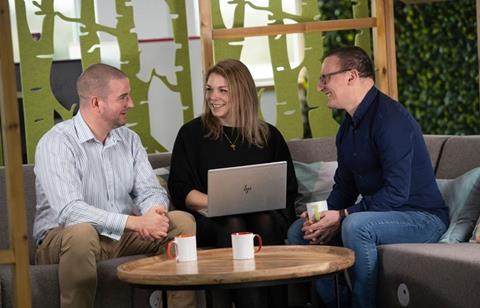
The reward strategy at Aster Group is very much led by the inclusive approach that the employer takes to managing its people. In placing a strong emphasis on recognising that individuals will want different things from their experience at work, Aster aims to retain its position as an employer of choice. Rachel Credidio, group people and transformation director at the housing association, explains: “That's very much where we where we want to be: to make sure that we retain the workforce now and recruit the one that we need into the future. It's very much about retention and attracting the best talent.”
In taking an inclusive approach to reward, the strategy has to be flexible, says Credidio. However this means avoiding too much segmentation which could polarise people too much. “We very much think about how we can have something that works for every single employee,” she says. “So we've tried to take that holistic approach offering personalised things, even down to flexible working. One of the things that has struck me is that the most comments I've had around flexible working have been from people with caring responsibilities who said, ‘I would have had to have left my job if I didn't have the flexible working offer that you provide’. That's the kind of thing that really makes the difference in terms of retaining [employees].”
Flexible leave
A key benefit in Aster’s reward strategy is its flexible leave policy, which allows employees to take leave days over their contracted annual holidays. Credidio says: “We want people to take the leave that they need. There's an absolutely open door to have a discussion about taking over and above that. That is our adopted policy because what we want are rested employees who are able to do their best work, not exhausted employees. It’s a very flexible policy; the psychological contract is very important in terms of feeling that there is personal discretion between [an employee] and [their] manager.”
The scheme was first trialled in part of the organisation and has since been adopted for all employees. Credidio explains that during the pandemic, even with home working, it was an important benefit to promote to employees. “We realised that people were under immense pressure and working incredibly hard. One of the things that we were really concerned about was that people would start getting burnt out and that was something that we wanted to prevent, so we wanted to make sure people took time out as well.”
Mental wellbeing approach
During the Covid-19 (Coronavirus) pandemic, Aster Group focused on its wellbeing and mental health strategy to ensure the employees were aware of, and had access to, the many benefits provided by the employer. Aster works with a qualified psychotherapist who provides mental health first aid training; the organisation now has 120 mental health first aiders among its 1,450-strong workforce. It has also run online mental health workshops for employees’ children and partnered with the mental health charity Dorset Mind, which provides virtual courses. “The mental health first aiders were already in place before [the pandemic], so that gave us a really good starting point,” says Credidio. “[Employees’] mental health was probably one of the most important aspects for us in the pandemic.”
Aster makes sure it keeps in contact with employees while they work remotely, and has moved some of its wellbeing initiatives online to keep people engaged. It runs virtual Zumba classes and online drawing classes for employees to learn a new skill. At Christmas, it ran a course on chocolate making which employees could involve their families in.
Benefits provision
Aster Group has an in-house reward team which administers its benefits provision. Employees have a comprehensive package which includes an employee assistance programme (EAP), virtual GP service, employer-funded health cash plan, a bikes-for-work scheme and financial wellbeing support.
It has also launched a new wellbeing campaign, Reconnect and rebalance, which is designed to support employees in the move from over 12 months of homeworking under restrictions, to a ‘work anywhere’ hybrid working pattern. Aster recognises that while some employees will be keen to get back to a workplace, others will be feeling anxious and cautious about reconnecting with people. The campaign will offer tools and resources to support employees reconnecting face to face, and rebalance their working week using the right workspace for them.
Employee voice is incredibly important to Aster, says Credidio. “We have a transformation network with over 100 employees involved in, which is a very strong part of our employee voice,” she explains. “It's very important to us to find out that we are doing the right things. We hold regular pulse surveys as well as an annual engagement survey. We were very pleased that in October our engagement scores were above national average, and have actually increased through the pandemic. I think [employees] felt that we were looking after them, so that was very reassuring that we were doing the right things.”
Credidio believes that the next challenge at Aster will be adapting to that hybrid way of working when some employees return to the workplace: “We really need to think about the impacts of Covid going forward, looking ahead and thinking about what our employees will need in the future.”
At a glance
Aster Group is a housing association that owns and manages more than 32,000 homes in the south of England, providing affordable homes to around 93,000 customers.
It has 1,450 employees working in a variety of roles including building development, management, maintenance and repair, customer services, housing sales, marketing, finance and communications.
It’s workforce is 53% female, 47% male, and the average age of employee is 44. The average length of service is 6.75 years, and the longest length of services is 35 years.
Primary business objectives that impact employee benefits
Aster Group is on a journey to modernise and improve its offer to both employees and customers. As part of this, it will continue its focus on creating a supportive and flexible working culture that empowers colleagues to be at their best. Benefits, such as fully flexible working, comprehensive health and wellbeing support and a flexible approach to leave are fundamental to its approach.

Career history
Rachel Credidio joined the development team at Aster Group in 2005. After holding a number of roles including sales and development director, she has since focused on driving change across the organisation. As group people and transformation director, Credidio leads the transformation in the way the organisation engages with its people to drive innovation, creativity, collaboration and productivity.
She says: “I say my job is all about trying to give people a better day at work, and so for me the personal stories about how we make a real difference to people are what give me a buzz. Seeing how a truly flexible approach to work has enabled so many people to get a better blend between work and home has been great, from those with elderly relatives to children and other commitments.”
















